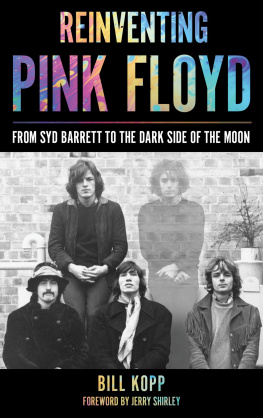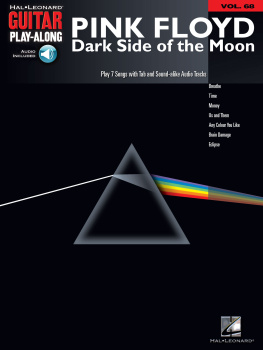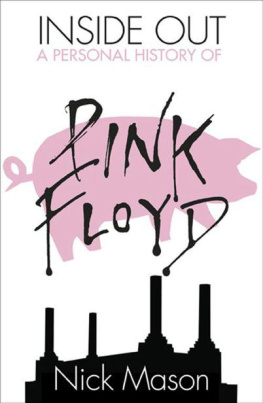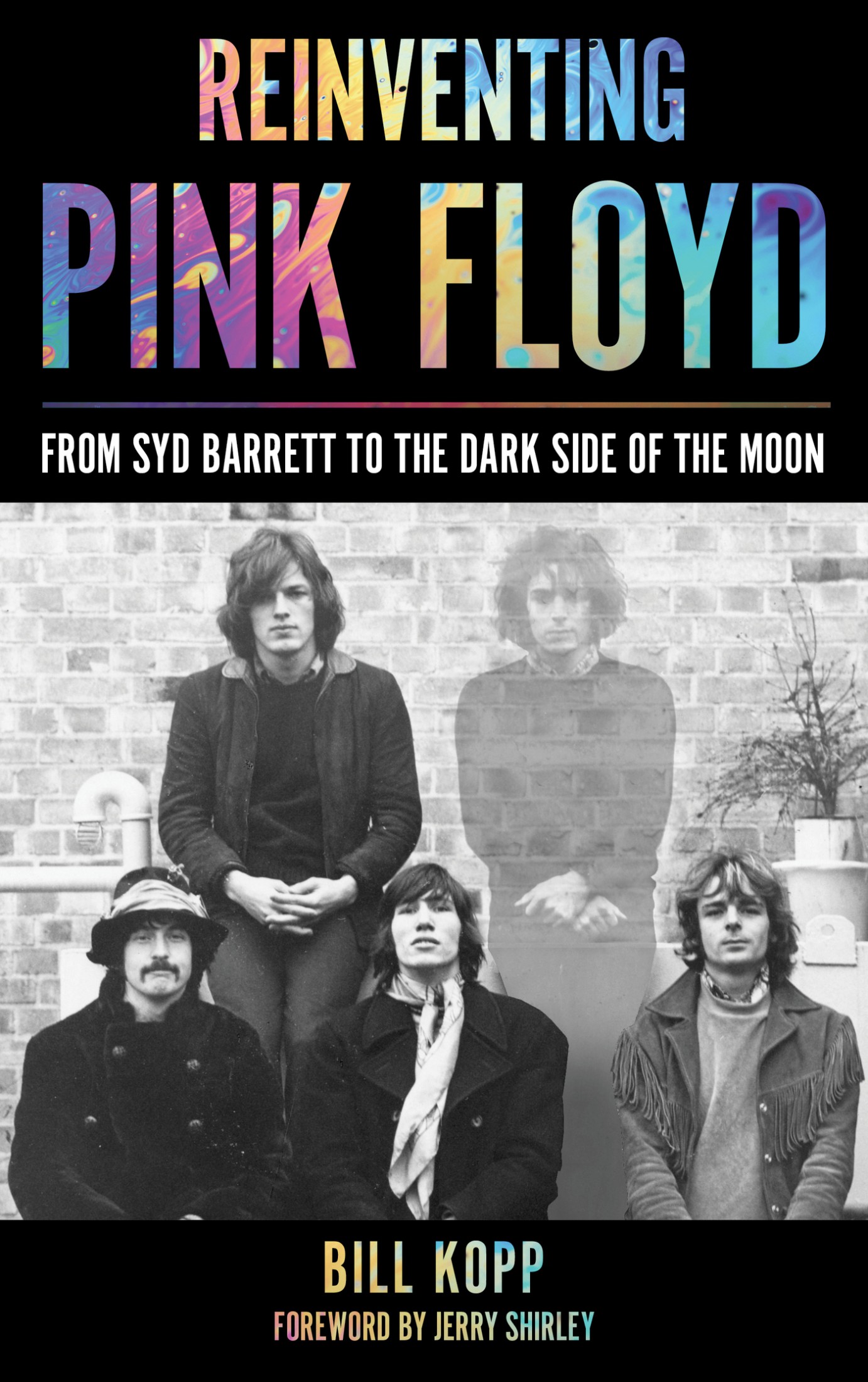Reinventing Pink Floyd
From Syd Barrett to
The Dark Side of the Moon
Bill Kopp
ROWMAN & LITTLEFIELD
Lanham Boulder New York London
Published by Rowman & Littlefield
An imprint of The Rowman & Littlefield Publishing Group, Inc.
4501 Forbes Boulevard, Suite 200, Lanham, Maryland 20706
www.rowman.com
Unit A, Whitacre Mews, 26-34 Stannary Street, London SE11 4AB
Copyright 2018 by The Rowman & Littlefield Publishing Group, Inc.
All rights reserved. No part of this book may be reproduced in any form or by any electronic or mechanical means, including information storage and retrieval systems, without written permission from the publisher, except by a reviewer who may quote passages in a review.
British Library Cataloguing in Publication Information Available
Library of Congress Cataloging-in-Publication Data
Names: Kopp, Bill, 1963 author.
Title: Reinventing Pink Floyd : from Syd Barrett to the Dark side of the Moon / Bill Kopp.
Description: Lanham, Maryland : Rowman & Littlefield, [2018] | Includes bibliographical references and index.
Identifiers: LCCN 2017046199 (print) | LCCN 2017046374 (ebook) | ISBN 9781538108284 (electronic) | ISBN 9781538108277 (hardcover : alk. paper)
Subjects: LCSH: Pink Floyd (Musical group) | Rock musicHistory and criticism.
Classification: LCC ML421.P6 (ebook) | LCC ML421.P6 K67 2018 (print) | DDC 782.42166092/2dc23
LC record available at https://lccn.loc.gov/2017046199
 TM The paper used in this publication meets the minimum requirements of American National Standard for Information Sciences Permanence of Paper for Printed Library Materials, ANSI/NISO Z39.48-1992.
TM The paper used in this publication meets the minimum requirements of American National Standard for Information Sciences Permanence of Paper for Printed Library Materials, ANSI/NISO Z39.48-1992.
Printed in the United States of America
For Annelise, Daniel, and Audrey.
Acknowledgments
The writing of Reinventing Pink Floyd would not have been possible without the dedicated and tireless contributions of my partner, Audrey Hermon Kopp. Audrey performed countless hours of research, and served as a wonderfully critical sounding board for the various ideas I set out to explore in this book. Audrey also patiently listened and commented as I read aloud each of the books chapters.
When Jim Dougherty learned of the book project, he kindly purchased 2016s The Early Years box set, and handed it over to me on long-term loan for research purposes. Jim also welcomed me as a guest on his weekly radio program, Closer to the Edge, allowing me to read selections from the manuscript many months before the books publishing date.
Quite coincidentally, early in 2017 my friend Ian Reardon put in place plans for a concert to honor the fiftieth anniversary of The Piper at the Gates of Dawn. Taking place in July of that year, the concert featured a rotating cast of more than a dozen local musicians playing only preTheDark Side of the Moon Pink Floyd music. I am honored to have been a part of that project, playing keyboards on eighteen songs. The experience of band rehearsals and performance helped me develop a deeper insight and understanding into Pink Floyds music of that era, one that no amount of careful listening alone could have achieved.
Were it not for the ongoing encouragement and mentoring of Cary Baker, my calling as a writerone that began only in middle agewould not have developed. Over the past decade-plus he has gone from a favorite music journalist to a valued resource, then to a trusted associate, and finally (while retaining all of those descriptors) to a dear friend.
In 2016, my longtime friend Jerry Stubblefield encouraged me to speak at a monthly salon hosted by him and his wife Cindy; the positive reaction I received reading from my shorter published works inspired me to pursue the Reinventing Pink Floyd project.
I am forever in the debt of those individuals who agreed to be interviewed by me for this book: Craig Bailey, Scott Chasolen, Ron Geesin, Lon Goddard, Peter Jenner, Steve Howe, Robyn Hitchcock, Barney Kilpatrick, Yogi Lang, Steve Mac, Davy OList, Joe Pascarell, Jason Sawford, Jerry Shirley, and John Willie Wilson.
Sincere thanks are also due to Steve Barker (BBC/On the Wire), Andr Cholmondeley, Bree Ishikawa, Billy James, Mushi Jenner, Bari Lieberman, Natalie Mandziuk and Katie OBrien at Rowman & Littlefield, Cheryl Pawelski, Michelle Roche, John and Muriel Vitaglione, Kerstin Vohland, Katrin Weber, Ann-Marie Whitfield, and Andrew Yoder.
Lastbut certainly not leastI am grateful for the support and encouragement of my sister Donna and my dad, Don Kopp. My mom, Geri, passed away in 2016, but I am sure she would have been very proud to see her sons work published in book form.
Bill Kopp, Asheville, NC, 2017
Foreword
Jerry Shirley
When I was barely sixteen years old, I was lucky enough to get a gig playing drums for a professional band called Wages of Sin, based in Cambridge, England. As a result, I had the good fortune to meet and play with many great musicians who have remained close friends to this day. Sadly, two of them, Syd Barrett and Richard Wright, are no longer with us. I am very pleased that the othersDavid Gilmour, Willie Wilson, Tim Renwick, and Rick Willsare still alive and well.
When I was approached to be interviewed for Bills book, my first reaction was to try and put him off, as I had grown tired of being interviewed about my involvement with Syds brief recording career. Plus, I was always mistakenly credited with being the main drummer on both of Syds solo albums when in fact my dear friend Willie Wilson played the bulk of the drums on Syds first album, The Madcap Laughs.
So, I gave poor Bill a somewhat ridiculous list of wants that were intended to put him off, as I tend to stay away from discussing Syd Barrett with anybody. This I do out of respect to his family, who, when Syd died, gave me the impression that they wished his memory to be left to rest in peace. That, of course, would be next to impossible, as he was such an important part of Pink Floyd and their early days.
One of my requests was that Bill would put things straight and talk to Willie, as well as me, and therefore give my old flatmate Willie the credit he so deserves and often didnt get. To my utter joy and pleasant surprise, not only did Bill say yes to that wish, he had already planned to try to find and interview Willie. So right there, I knew he was not only well-intended but also was well-informed about his subject matter, where so many before him had not been.
As harrowing as working with Syd was, it was an extreme honor to be asked and I am forever grateful that I got to be part of what has become rock folklore.
I played in Humble Pie alongside rock n roll legends Steve Marriott and Peter Frampton. I also played drums for B. B. King on his 1971 album, B.B. King in London; John Entwistles first solo album, Smash Your Head Against the Wall (that same year); and, to top it all off, I played some percussion on George Harrisons All Things Must Pass. But in all my years, I have never been asked nearly as much about that incredible list of good musical fortune as I have about working with Syd Barrett. Such is the intrigue that continues to surround him and his music.
I have seen every stage of the Floyds progression, from when Syd left all the way through to the very end. Much like all of us British bands, the more we toured the United States the better we got. Pink Floyd were no different in that respect. Plus, once David had found his place in the band after Syd left, he kept helping to improve their musicality. Along with Rick Wright, David provided the strong musical foundation of the band.













 TM The paper used in this publication meets the minimum requirements of American National Standard for Information Sciences Permanence of Paper for Printed Library Materials, ANSI/NISO Z39.48-1992.
TM The paper used in this publication meets the minimum requirements of American National Standard for Information Sciences Permanence of Paper for Printed Library Materials, ANSI/NISO Z39.48-1992.